Nutrient Deficiencies and What Your Body Reveals
7 Signs That You May Be Suffering From Vitamin D Deficiency
According to the Centers for Disease Control and Prevention (CDC), 32 percent of adults and children in the U.S. are vitamin D deficient. While people get vitamin D from food and sunlight, Dr. Michael Holick, a leading vitamin D researcher, believes that about 50 percent of the general population is at risk of deficiency. This can cause bone pain, muscle weakness, and, in severe cases, can lead to thin, brittle, or misshapen bones. That’s why it’s important we all take steps to make sure we’re getting enough of the vitamin, including being aware of the following seven signs and factors that point to deficiency:
1. Darker Skin

Holick says people with darker skin may need as much as 10 times the sun exposure lighter-skinned people get to obtain the same amount of vitamin D. Skin pigment acts as a natural sunscreen, so more pigment requires more time in the sun. That’s why people with darker skin are at a greater risk of deficiency.
2. You’re Over 65 Years Old

People over 65 also have a higher risk of not getting enough vitamin D because they spend more time indoors and produce less than younger individuals when they’re exposed to the sun.
3. You’re Moody Or Depressed

A group of researchers studied 80 elderly patients. What they found was that patients with the lowest vitamin D levels were 11 times more likely to be depressed than those who had healthy levels.
4. You’re Overweight, Obese, Or Have High Muscle Mass
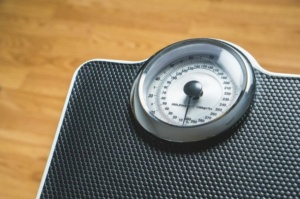
Vitamin D is fat-soluble, so individuals with a higher percentage of fat in their bodies need more vitamin D than people with a lower fat percentage. This also applies to people with a lot of muscle mass.
5. Aching Bones And Muscles
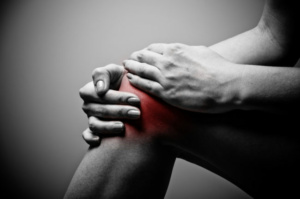
People with vitamin D deficiency are more likely to have back pain and bone pain in their legs, ribs, or joints compared to those with normal levels of vitamin D.
6. Sweaty Head

Holick says one of the first signs of vitamin D deficiency is a sweaty head.
7. Gastrointestinal Issues

Gastrointestinal issues that affect your body’s ability to store fat could lead to lower absorption of vitamin D, which, if you’ll remember, is a fat-soluble vitamin.
A blood test is the only way to confirm vitamin D deficiency, but if you fit any of the above descriptors or experience these symptoms, it’s definitely worth a visit to your doctor.
What Your Fingernails Say About Your Health
Ever wonder why your nails are so brittle, yellow, or otherwise discolored? Though you may not know it, these seemingly harmless symptoms may indicate you have some underlying health issues. According to John Anthony, MD, a dermatologist at the Cleveland Clinic in Ohio and Debra Jaliman, MD, a New York City-based dermatologist and author of “Skin Rules,” there are certain nail symptoms that definitely shouldn’t be ignored. Here’s what eight different nail conditions are signaling about your health.
1. Yellow Nails
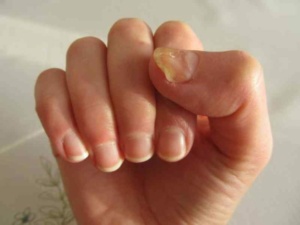
According to WebMD, one of the most common causes of yellow nails is a fungal infection. But in rare cases, they also say that it can indicate a more serious condition such as diabetes, thyroid disease, or lung disease. Smoking can also stain the nails yellow.
2. Cracked or Brittle Nails
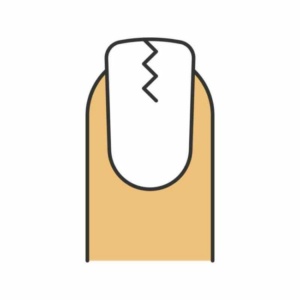
Dr. Jailman says cracked or brittle nails can be a sign that the nail plate is extremely dry. The condition has also been linked to thyroid disease. Hypothyroidism sometimes causes this side effect as well.
3. Pitted Nails
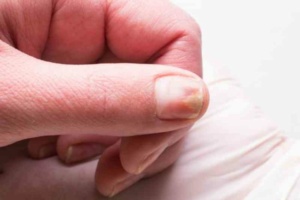
According to MedicineNet, nail pitting is caused by the defective development of the layers of the nail plate, and it is common for those suffering from psoriasis.
4. Ridged Nails
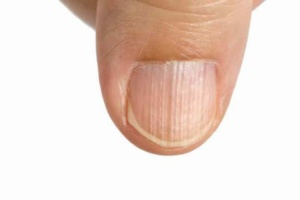
Dr. Anthony explains that the reason people will see horizontal ridges on their nails is that there could be direct trauma to the nail, or it could also be a cause of a more serious illness, in which case you’ll see it on more than one nail. That’s because the body is focusing its energy on fighting the illness rather than the nails.
5. Discolored or Dark Lines Beneath
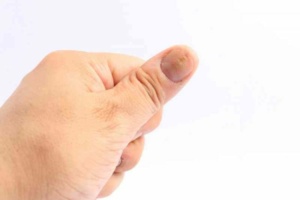
According to WebMD, discoloration or a dark line on the nail can sometimes be caused by melanoma, the most dangerous type of skin cancer. Melanoma can also cause a black line or stripe on the nail. It’s important to visit your doctor as soon as possible if you notice this.
6. Bitten Nails
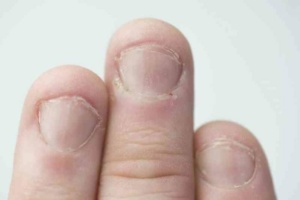
According to Medical Daily, the American Psychiatric Association’s Diagnostic and Statistical Manual of Mental Disorders (DSM) classifies nail-biting as one of the symptoms of obsessive-compulsive disorder. If it becomes excessive, you should visit your doctor.
7. Bluish Nails
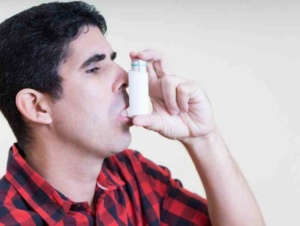
WebMD explains that when your nails become bluish, it is a sign that the body may not be getting enough oxygen. Lung problems and heart problems are among the possible causes.
8. White Spots
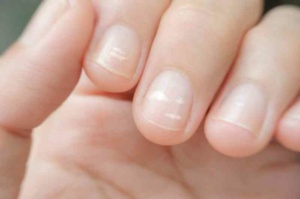
Some have mistakenly concluded that white spots on nails mean calcium deficiency, but Dr. Anthony says they are often a result of trauma such as hitting your finger against something.
If you’ve noticed any of these conditions in your own nails and are concerned, be sure to visit your doctor.
Facts you do not know about your skeleton
Our bones are known to be living tissue capable of repairing and reshaping themselves in accordance with our daily activity.
Adam Taylor, professor and director of the Center for Clinical Anatomy Education and Rebecca Shepherd, a Ph.D. student at Lancaster University, presented six new facts that many may not know about our skeleton.
- Not everyone has the same number of bones The textbooks state that the human skeleton is composed of 206 bones.
A recent study has shown that some bones can grow over time depending on the diet. For example, the bones of the foil, ossified cartilage of the calf, have become more prevalent in the human body due to improved nutrition.
- The skeleton has no fixed length The change in the height of the child in his first year is the fastest, and also stops the length of the increase from mid to late adolescence. But the fact that our bones have stopped growing does not mean that our height is constant.
This is due to the presence of cartilage at the joints. Cartilage consists of a rubber layer of tissue consisting of water, collagen, proteoglycans, and cells.
By gravity, cartilage is compressed throughout the day, especially the spine, leading to short stature. However, these cartilages return to their original size when you relax at night in bed. This explains that the length of astronauts increases by 3% after a period in space.
It’s not just cartilage. Scientists have shown that when running, the tibia is temporarily shortened by one millimeter.
- We have greatness independent of the temple Bones in the skeleton are connected to each other. However, this does not apply to the hyoid bone, which is located at the base of the tongue in the form of a horseshoe and is held in place by the muscles and ligaments between the base of the skull and the jawbones.
This greatness enables humans to speak, breathe and swallow. They are broken only in rare cases indicating death as a result of strangulation or hanging.
- Bone marrow is not just a filler Long bones, such as the femur, are filled with bone marrow made from fat cells, blood cells, and immune cells.
The marrow is red in children, reflecting its role in making blood cells. It is yellow in adults and contains 10% of all body fat.
Bone marrow fat cells have long been thought to be nothing more than a filler, but scientists have shown that fat inside the bones has metabolic functions associated with important endocrine glands that affect the entire human body.
- the smallest bones of the temple three The smallest in the human body is the bones of the hammer, anvil and passengers. These tiny bones transmit sound vibrations from the air to the liquid in the inner ear.
These bones are unique in our bodies and are not reconstituted after the first year of life, because any change in their shape may affect hearing. These bones are important in the study of genetics and forensic medicine because they form when we are in the womb.
- Bones cause tension Our sympathetic nervous system is the mechanism by which the body prepares for its intense activity, for example, the body secretes the hormone adrenaline in response to a stressful situation.
Recently, researchers have discovered osteocalcin released by bone-forming cells as a key factor when responding to stress.
Experiments in mice have shown that those born with no ability to produce osteocalcin would not have been able to withstand stressful situations compared to normal mice.
When examining the levels of osteocalcin in humans, scientists found that its levels rise in blood and urine after exposure to stress.